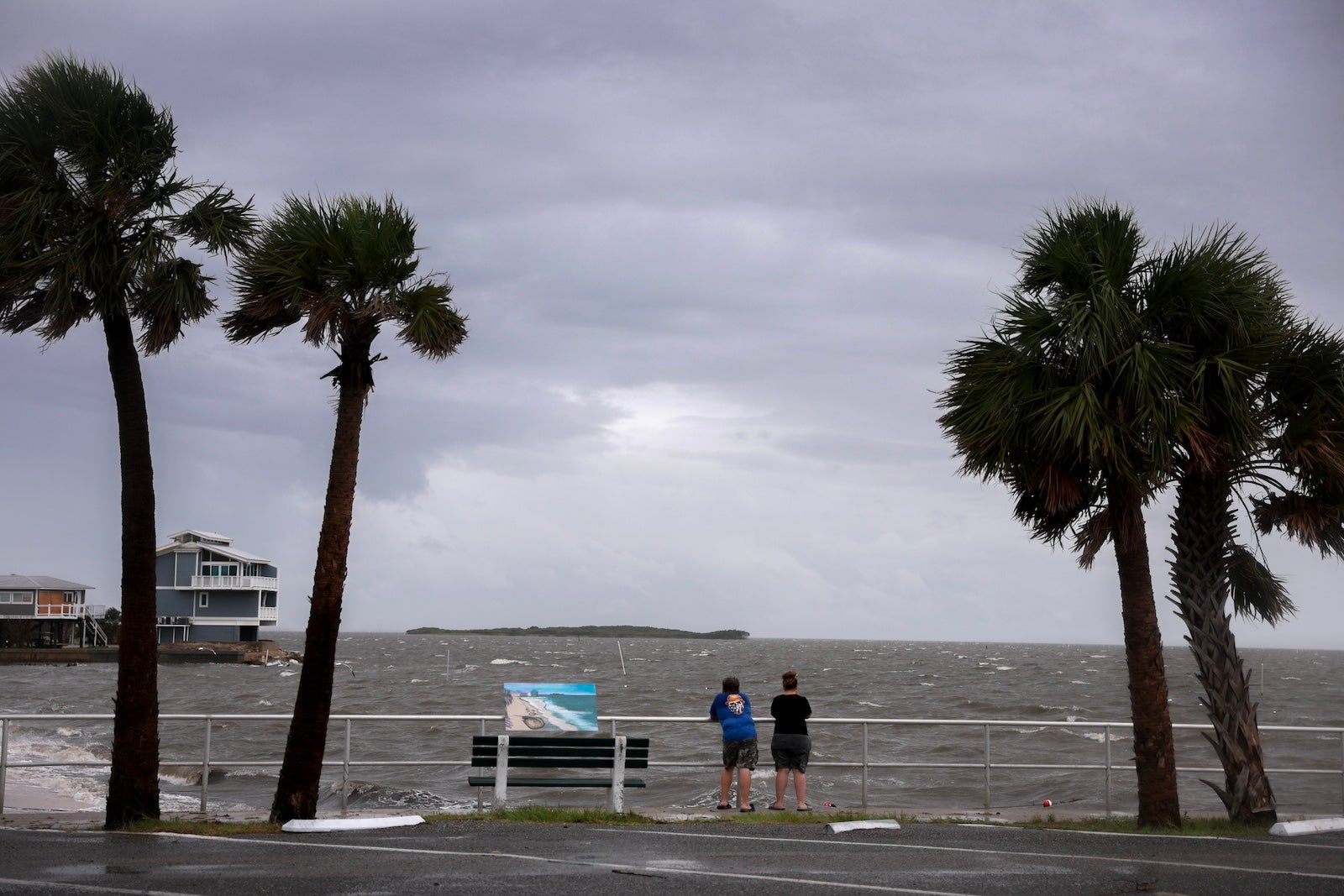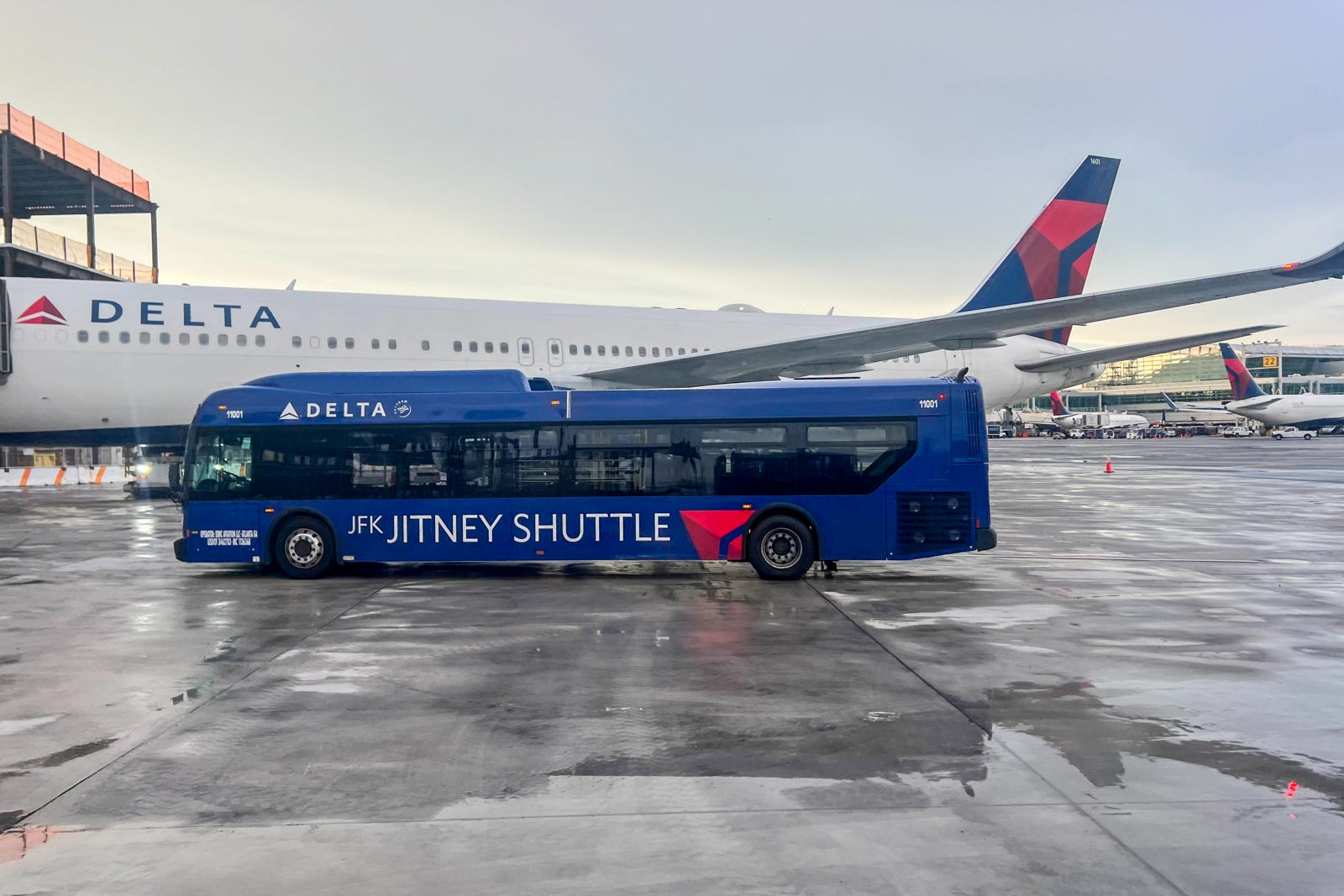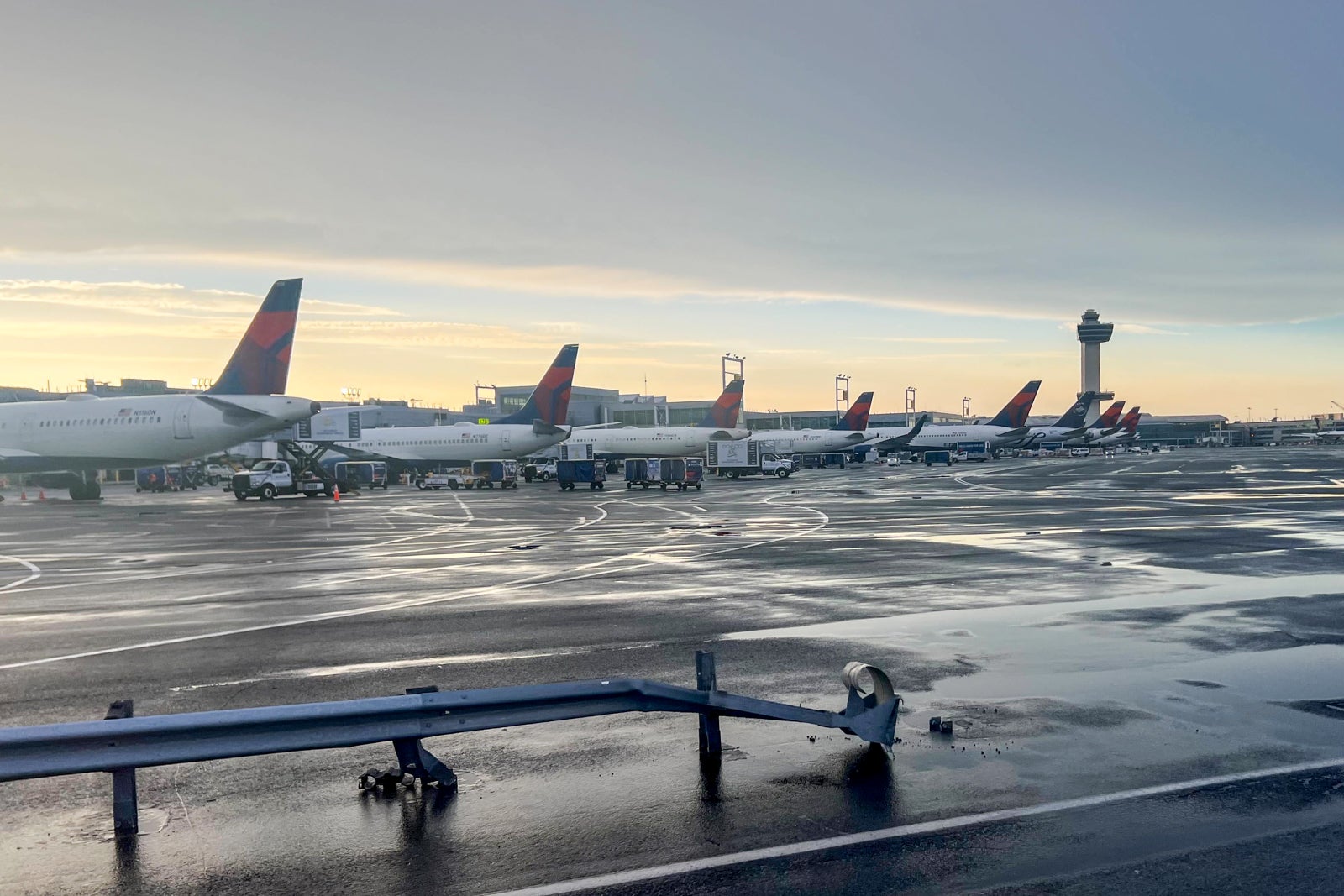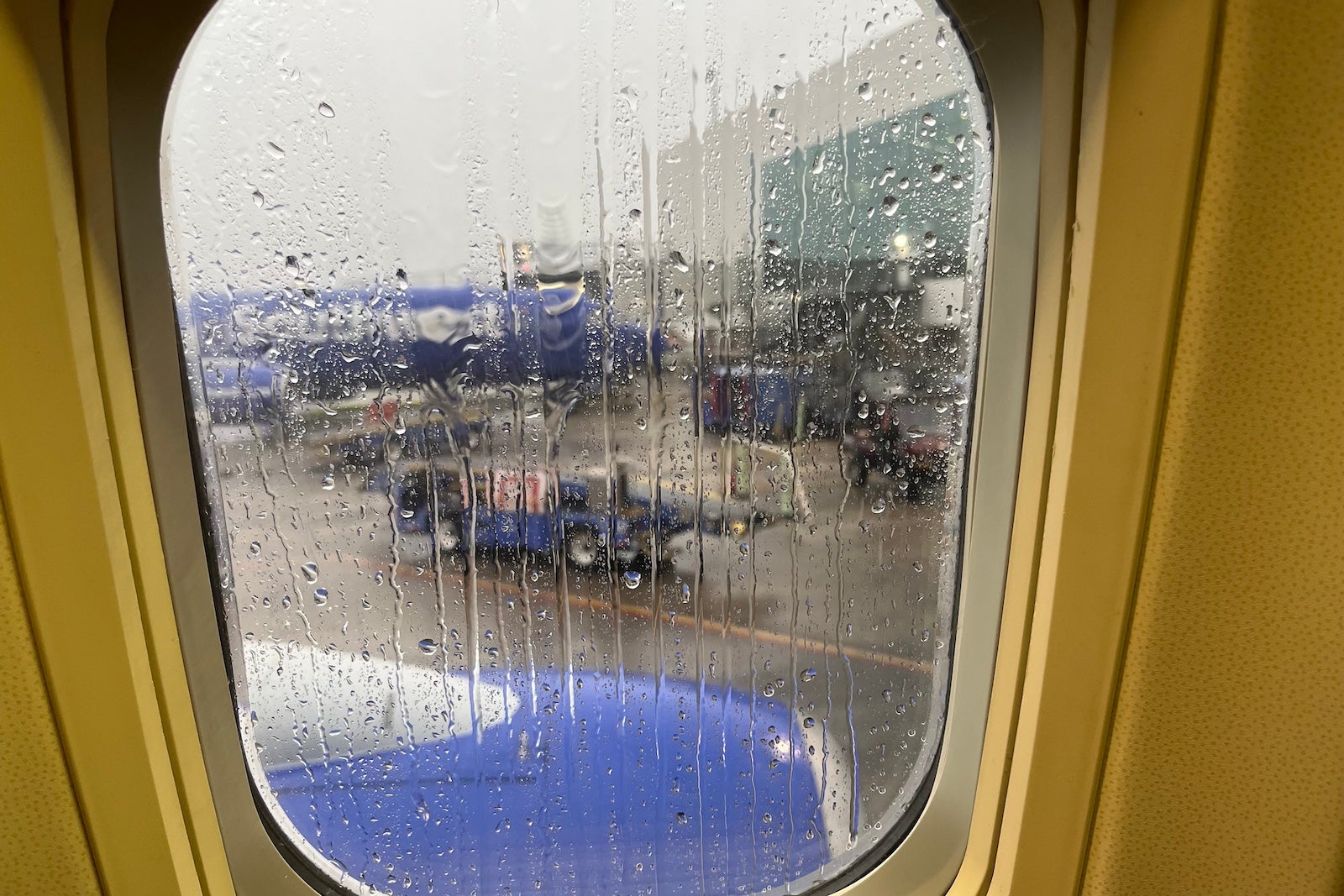Thousands of flights affected as Debby makes landfall – The Points Guy

Flight cancellations are mounting Monday as Tropical Storm Debby bares down on Florida — disruptions that come in the wake of an already messy few days for air travel amid severe storms up and down the East Coast.
By 2:30 p.m. EDT Monday, airlines had canceled more than 1,600 flights in the U.S., according to data from flight-tracking site FlightAware.
The disruptions are most heavily concentrated in Florida and the Southeast, areas where Debby’s high winds and heavy rains were forecast to be strongest.
The Federal Aviation Administration expected cancellations and delays to continue piling up over the course of the day, the agency said Monday morning.
As of mid-afternoon Monday, Orlando International Airport (MCO) had seen more than a fifth of its departing flights scrapped. Cancellation rates are approaching 30% at Tampa International Airport (TPA) and sit at around 10% at Miami International Airport (MIA), FlightAware shows.
Debby made landfall in Florida on Monday morning as a Category 1 hurricane, with the National Hurricane Center warning about potentially catastrophic flooding.
The storm “continues to cause major flight disruptions for passengers traveling to and from Florida,” Tampa airport officials warned in a statement late Monday morning, noting the airport is operational, but expected to halt operations at times due to heavy rain, high winds and lightning.
On social media Monday, Transportation Secretary Pete Buttigieg warned of potential air travel (and ground travel) disruptions as the storm bears down on the Southeast.
Travelers have already faced cascading delays and cancellations elsewhere along the East Coast in recent days, after a stormy weekend fueled thousands of flight cancellations. Since Friday, more than 6,000 departures have been canceled, per FlightAware.
Daily Newsletter
Reward your inbox with the TPG Daily newsletter
Join over 700,000 readers for breaking news, in-depth guides and exclusive deals from TPG’s experts
“We’ve been extremely fortunate with weather this year. Until now,” said Marty St. George, president of New York-based JetBlue, in a social media post.
A messy weekend for air travel
Passengers faced major headaches over the weekend at a slew of East Coast airports, including major airports in the New York City area. TPG managing editor Clint Henderson, who was among the travelers caught in the weekend’s disruptions, faced a lengthy ground delay following a transatlantic flight on Delta Air Lines to John F. Kennedy International Airport (JFK), finally arriving to a remote stand before having to deplane onto a bus to get to customs.
American Airlines, which has six hubs along the East Coast, has seen its operations affected the most of any U.S. carrier in recent days. American has canceled nearly 1,400 flights since Saturday, including close to a fifth of its operation on Sunday.
These weather-related hurdles are the latest chapter in a frustrating few weeks for air travelers. The industry faced thousands of cancellations following a late-July IT outage at CrowdStrike, which helped precipitate a dayslong operational meltdown at Delta Air Lines now under investigation by the U.S. Department of Transportation.
Between Memorial Day weekend and July 18, U.S. carriers canceled 1.5% of flights, FlightAware data shows. The industry’s collective cancellation rate is well over 3% since July 19.
Tips for navigating air travel this week
Here are a few steps you can take if you’re affected by the current disruptions, or have a trip booked for the coming days.
Follow the advice of local authorities
Safety comes first. If you’re in an affected area, follow the guidance of local authorities before deciding to leave home and head to an airport.
Keep an eye out for travel alerts
Keep an eye on your email and your airline’s app to see if your trip ends up getting covered by a travel alert, which could allow you switch up your itinerary to avoid the greatest disruptions from severe weather.
Several U.S. airlines have issued travel alerts in recent days, both to cover trips affected by this past weekend’s severe weather, and the effects of Debby. Travel alerts generally give passengers more flexibility to change a ticket and rebook without paying a fare difference when major disruptions strike.
American, for instance, issued travel alerts for many East Coast airports amid storms over the weekend, and did the same for Florida airports likely to be most affected by Debby.
Remember your right to a refund
Generally, weather-related cancellations and delays leave passengers with few opportunities to claim reimbursement or compensation from airlines — unlike maintenance, or a major IT snafu like we saw a few weeks ago.
Since weather is seen as outside an airline’s control, the promises carriers have made on the U.S. Department of Transportation’s customer service dashboard generally do not apply when a hurricane (or a thunderstorm, or blizzard) stymies air travel.
However, federal refund rules do still apply.
If your flight is canceled or significantly delayed and you choose not to travel, and if you don’t accept accommodations like rebooking, you’re owed a refund for the unflown portion of your ticket — regardless of the reason for the disruption.
Don’t forget about credit card protections
Although airlines are unlikely to provide any compensation when weather-related flight disruptions leave you stranded, travel insurance protections you have through a credit card can come in handy.
A handful of popular travel credit cards come with coverages that can help you recoup the cost of unexpected hotel nights, meals and ground transportation incurred during flight trouble — including disruptions fueled by weather.
Have your airline app at the ready
Expect long lines at customer service, and lengthy waits to talk with a customer service agent by phone.
Oftentimes, though, you can use your airline’s app to rebook yourself on another flight with a few taps. This is a favorite tactic of mine to avoid waiting on hold for a long time.
Your airline app can also help you track your bags (on many airlines) and show you where your incoming flight is, giving you an early sense for whether your flight has a chance to depart on time.
Be prepared for the unexpected
Traveling during disruptions like those seen this week can be a bit of a chaotic experience, so they more you can pack your patience and be prepared for the unexpected, the better. Have snacks at the ready, in case you end up spending more time than expected waiting, in line, sitting at the gate or on board your plane than expected.
Before boarding a flight, use the restroom and make sure you have a full bottle of water; it’s possible your aircraft could get stuck in a lengthy ground delay due to the cascading disruptions. That could delay inflight service, and passengers generally aren’t allowed to move about the cabin while sitting on a taxiway.
And, be prepared for crowds — both on the airport concourse and, potentially, even in lounges where you’re a member. Mounting delays and cancellations means lots of passengers stuck in the terminal, and seats fill up quickly.
Here’s more on what you can do if your flight is canceled or delayed.
Related reading:
Related
Turkish Airlines and Qatar Airways Suspend Mogadishu Flights Following US…
Home » Airlines News of Qatar » Turkish Airlines and Qatar Airways Suspend Mogadishu Flights Following US Embassy Terror Alert, Raising Security Concerns at
Local tourism destinations grow fast
Men sit at the Doha Corniche backdropped by high buildings in Doha on March 3, 2025. Photo by KARIM JAAFAR / AFP DOHA: Local tourism destinations are g
Hajj, Umrah service: Qatar Airways introduces off-airport check-in for pilgrims
Image credit: Supplied Qatar Airways has introduced an off-airport check-in
IAG, Qatar Airways, Riyadh Air, Turkish Airlines, Lufthansa & more…
Turkish Airlines – a Corporate Partner of the FTE Digital, Innovation & Startup Hub – is charting a course to rank among the top 3 global airlines for















